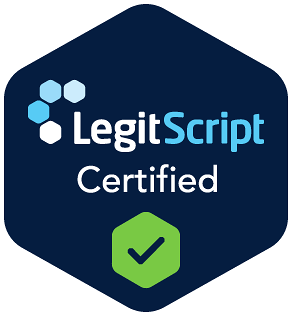Anxiety Treatment in New Jersey: Spotting the Signs and Evidence-Based Treatment
Anxiety disorders can take many different forms, depending on the person and situation. To numb or escape these symptoms, some begin using substances—alcohol to calm nerves, stimulants for energy, or marijuana to quiet racing thoughts. Sadly, anxiety and addiction often go hand in hand.[1] For many people, substance use begins as a way to manage overwhelming worry, panic attacks, or chronic fear. Others develop anxiety as a result of long-term substance abuse, leaving them trapped in a cycle that feels impossible to break.
Whether an individual is struggling with themselves or watching a loved one suffer, there are options to help.
Key Points
- Anxiety is a normal response to stressors in life, but for some, it can be more than a simple stress response.
- Anxiety and addiction often reinforce each other in a harmful cycle
- Self-medicating with drugs or alcohol can worsen symptoms over time
- Common anxiety disorders include GAD, panic disorder, and social anxiety
- Evidence-based therapies like CBT and DBT are key to dual diagnosis recovery
What Is Anxiety?
Anxiety disorders are mental health conditions that result in symptoms disproportionate to the stressor. They may cause dread, fear, and various other symptoms that can make it difficult to maintain normal daily function.
Anxiety and addiction frequently occur side by side, presenting as what’s known as a co-occurring disorder or dual diagnosis. [2] This means someone is living with both a mental health condition—such as generalized anxiety disorder, panic disorder, or social anxiety—and a substance use disorder. It’s more common than many might think.
Many people turn to drugs or alcohol to cope with the intense worry, fear, or restlessness that anxiety brings. Others find that substance use worsens or even triggers anxiety symptoms. In either case, treating just one condition without addressing the other often leads to relapse, frustration, and prolonged suffering.
Addiction and Interaction with Anxiety
Common signs of co-occurring anxiety and addiction include persistent worry, restlessness, trouble sleeping, irritability, and physical symptoms like chest pain or shortness of breath. [3] People with anxiety may experience panic attacks or avoid social situations out of fear.
What starts as a way to cope can gradually turn into a dependence over time. Substance abuse alters the brain’s stress response system, making anxiety even more challenging to manage without drugs or alcohol. [4]
Anxiety and addiction often feed off each other in a complex cycle. [5] Together, anxiety and addiction form a cycle: anxiety drives substance use, which then worsens anxiety. The longer this cycle persists, the more profoundly it can impact a person’s relationships, physical health, and ability to function in daily life. That’s why a dual diagnosis approach, which treats both conditions simultaneously, is crucial for genuine and lasting recovery.
Take the first step towards recovery.
Our representatives are standing by to help you start healing today.
How Anxiety Feeds Addiction (and Vice Versa)
When someone is overwhelmed by anxiety—whether it’s constant worry, racing thoughts, or panic attacks—they may turn to drugs or alcohol to self-medicate. In the short term, substances might seem to take the edge off, but over time, they usually make anxiety worse.
This pattern is especially common for people with social anxiety disorder. [6] They might drink before events to feel more confident or use stimulants to push through the day. Once the effects wear off, anxiety comes back stronger—and often with physical symptoms like chest tightness, insomnia, or a rapid heartbeat.
Substance abuse and anxiety create a loop that’s hard to break without support. As tolerance builds, people need more of the substance just to feel “normal,” and their baseline anxiety increases. That’s why addressing both the anxiety and the addiction at the same time is crucial for real healing.
Understanding the Types of Anxiety Disorders
Anxiety isn’t the same for everyone who experiences it. Several types of anxiety disorders commonly overlap, and each one brings its own set of challenges. [7]
- Generalized Anxiety Disorder (GAD): People with GAD live with near-constant worry. It’s not just stress—it’s a persistent sense of dread that affects sleep, appetite, and daily life.
- Social Anxiety Disorder: This goes beyond shyness. It’s a fear of social situations so intense that it can lead someone to avoid work, friendships, or even leaving the house.
- Panic Disorder: Characterized by sudden, intense fear and symptoms that can be physical, like a pounding heart, shortness of breath, or feeling like you’re dying—panic attacks are both frightening and exhausting.
- Obsessive-Compulsive Disorder (OCD): OCD causes unwanted thoughts (obsessions) and repetitive behaviors (compulsions) driven by anxiety.
- Specific Phobias: These involve a very intense fear of a particular thing or situation, like flying, spiders, or public speaking.
Evidence-Based Treatment for Anxiety
When anxiety and substance use occur together, they tend to fuel one another, making recovery more difficult without an integrated approach. That’s why evidence-based treatment is so necessary.
Addressing both conditions simultaneously helps reduce the risk of relapse, improves emotional regulation, and supports a more stable long-term recovery. [8]
A combination of proven treatment options can be tailored to each individual’s specific needs. Cognitive Behavioral Therapy (CBT) helps clients identify and reframe anxious thought patterns. At the same time, Dialectical Behavior Therapy (DBT) builds skills like distress tolerance and emotional regulation, particularly helpful for those with intense anxiety or panic symptoms.
Treatment may include medication management when clinically appropriate. For example, clients may receive non-addictive medications to stabilize anxiety symptoms while also participating in psychotherapy to build healthier coping strategies.
Beyond talk therapy, healing can be supported through holistic tools such as mindfulness practices, exposure therapy (for phobias or panic-related behaviors), and expressive wellness activities. These approaches help calm the nervous system and foster new habits that support recovery in everyday life.
Levels of Care for Anxiety in New Jersey
Treatment for anxiety isn’t one-size-fits-all, and the programs designed to treat anxiety shouldn’t be either.
For lasting healing, a complete treatment program designed to meet clients where they are in their journey is essential. Whether someone requires the safety of residential treatment or the flexibility of an Intensive Outpatient Program (IOP), care plans should be tailored to the level of care to meet their unique needs.
- Intensive Outpatient Program (IOP): Meeting several times a week, IOP offers treatment on a schedule that allows individuals to return home following treatment.
- Outpatient Treatment: Less frequent sessions only a few times a week are ideal for individuals who need some extra support but don’t need intensive treatment.
Choosing the Right Anxiety Treatment Center
Finding the right anxiety treatment center is about more than location—it’s about finding a place that truly understands. If an individual is dealing with co-occurring disorders, they should look for a treatment center specializing in dual diagnosis care. These programs are designed to treat both conditions simultaneously, resulting in improved outcomes and lower rates of relapse.
Also, consider the flexibility of the mental health treatment options available. Some clients benefit from in-person healthcare in a residential setting, while others require more flexible outpatient or virtual formats.
A high-quality program will help create a personalized treatment plan tailored to individual needs and goals. The most effective centers also offer trauma-informed care and access to peer support, acknowledging the role of past experiences and community in the healing process. When anxiety and addiction overlap, comprehensive and compassionate care can make all the difference.
Frequently Asked Questions About Addressing Anxiety and Addiction in New Jersey
Can I start dual diagnosis anxiety and addiction treatment if I’m still using drugs or alcohol?
Yes. Many people enter treatment while still actively using. Starting early can prevent further harm. Your care team assesses your situation and may recommend detox or stabilization before beginning anxiety-focused therapy.
How long does treatment for anxiety and addiction in New Jersey take?
It depends on the severity of an individual’s symptoms and the type of support they require. Some people benefit from a few weeks of intensive care, while others continue outpatient services for months. The treatment plan evolves as they progress through their treatment.
Will I be prescribed medication?
Not always, but it may help. For some people with co-occurring substance use disorders and mental illness, non-addictive medications can ease anxiety symptoms and make therapy more effective. Your providers will help you decide what’s appropriate.
Can my family be part of my care?
Yes. Involving loved ones through family therapy can improve outcomes and strengthen your support network. It also helps your family develop healthy coping skills and gain a better understanding of what you’re going through.
What’s the difference between CBT and DBT?
Both are types of psychotherapy. CBT focuses on identifying and working on changing negative thoughts and behaviors, while DBT emphasizes emotional regulation, distress tolerance, and mindfulness.
Sources
[1][5] Back, S. E., & Brady, K. T. (2008). Anxiety Disorders with Comorbid Substance Use Disorders: Diagnostic and Treatment Considerations. Psychiatric Annals, 38(11). https://doi.org/10.3928/00485713-20081101-01
[2][8] Nami, & Nami. (2024c, May 31). Understanding dual diagnosis. National Alliance on Mental Illness (NAMI). https://www.nami.org/advocate/understanding-dual-diagnosis/
[3] Anxiety disorders. (n.d.). National Institute of Mental Health (NIMH). https://www.nimh.nih.gov/health/topics/anxiety-disorders
[4] Fosnocht, A. Q., & Briand, L. A. (2016). Substance use modulates stress reactivity: Behavioral and physiological outcomes. Physiology & Behavior, 166, 32–42. https://doi.org/10.1016/j.physbeh.2016.02.024
[6] Alcohol and other substance use to cope with social anxiety | National Institute on Alcohol Abuse and Alcoholism (NIAAA). (2023, May 9). https://www.niaaa.nih.gov/news-events/spectrum/volume-15-issue-2-spring-2023/alcohol-and-other-substance-use-cope-with-social-anxiety
[7] Anxiety disorders. (2025, June 2). Cleveland Clinic. https://my.clevelandclinic.org/health/diseases/9536-anxiety-disorders



